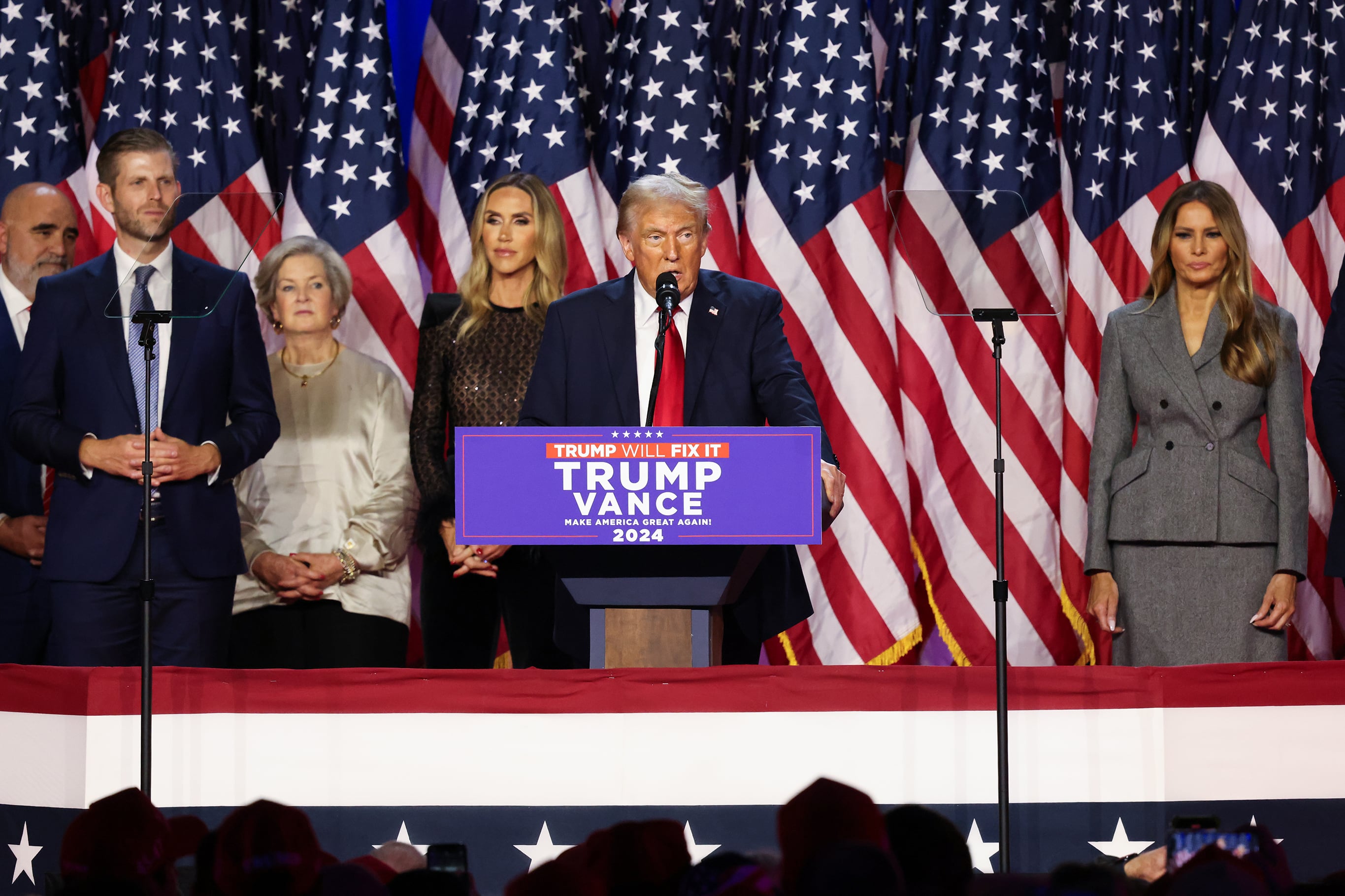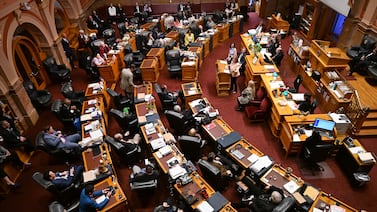Sign up for Chalkbeat’s free weekly newsletter to keep up with how education is changing across the U.S.
On the campaign trail, Donald Trump pledged to get rid of the U.S. Department of Education, expand school choice, roll back new protections for LGBTQ students, and deport millions of undocumented immigrants.
Now that the former Republican president is headed to a second term, the question becomes how likely Trump is to act on those ideas and others — and what effects students, teachers, and parents might see in the classroom.
There is significant uncertainty. Trump has not laid out detailed education policy proposals, and some key ideas were floated but not enacted in his first term.
At the same time, Trump’s decisive victory — he won the popular vote, picked up nearly every swing state, and made gains among young voters and voters of color — could create new political openings.
Chalkbeat spoke to advocates, experts, and former education department officials about what to expect from the next administration. They widely agreed that President Joe Biden’s Title IX rewrite, which extended new protections for transgender students and is currently tied up in the courts, will be repealed, that civil rights enforcement will look very different, and that future education budgets will be more austere.
But they disagreed on how likely it is that Trump would actually do away with the U.S. Department of Education and how much progress he might make toward federal support for school choice.
Many said they do not expect to see federal policy focused on improving education, even as students are still struggling to recover from the wide-ranging effects of pandemic school closures, chronic absenteeism remains high, and many students graduate poorly prepared for college or skilled jobs.
“We are getting ourselves into a position where we are seriously under-educating large, large numbers of students,” said Thomas Toch, the founding director of FutureEd, a think tank based at Georgetown University. “It’s almost at a crisis point.” But Toch doesn’t expect leadership from a Trump administration.
What does happen will depend on who controls Congress. Republicans have regained the Senate, but control of the House remains unclear and may not be known for days. A trifecta could clear the way for a broader Trump agenda. Trump’s pick for education secretary — whether he opts for an experienced administrator or a dedicated culture warrior — will matter, too.
For now, conservative parents’ rights groups and school choice advocates hailed Trump’s victory as a win for their perspective.
“Time to put parents back in the driver’s seat when it comes to their children’s education!,” Moms for Liberty co-founder Tiffany Justice, who campaigned alongside Trump, wrote on the social media platform X.
Calls to abolish the Department of Education have new momentum
Arguably this has been Trump’s most consistent promise on education policy, but also the one that seems most far-fetched to some political observers. Conservatives have talked about getting rid of the department for almost as long as it’s existed, and Trump didn’t make any moves to dismantle it in his first administration.
Fully dismantling the department would require an act of Congress. But Trump could limit its reach in other ways, such as eliminating or moving programs, removing career bureaucrats, and proposing much tighter budgets.
But Jim Blew, who served in Trump’s education department in his first administration and went on to found the Defense of Freedom Institute, said Trump has been adamant that he wants to get rid of the department, and that alone gives the idea more “heft.” Blew also believes public support for a federal role in education is changing. Many people don’t think the federal investment in COVID recovery yielded much, he said. At the same time, people see the Biden administration’s approach to Title IX changes and student loan forgiveness as examples of federal overreach.
It would take months to take the department apart, Blew said, because every function mandated by Congress would need a new home. But that could be done, he said. Civil rights enforcement could move to the U.S. Department of Justice, for example, and Title I funding for high-poverty schools could become a block grant administered by the U.S. Department of Health and Human Services.
Trump has been clear that his priorities are economic recovery, immigration, and national defense, Blew said, but that doesn’t mean he won’t follow through on education promises.
“It doesn’t need a lot of attention,” Blew said. “It needs political capital. And he can expend that while remaining focused on other priorities.”
Immigration enforcement could ripple through school communities
Trump made demonization of immigrants the centerpiece of his campaign, highlighting at every turn examples of crimes committed by undocumented immigrants or asylum seekers and the impact of immigration on American communities and schools.
Trump has promised to carry out the largest deportation operation in American history. Some experts on immigration policy have said such an effort would be legally and logistically challenging, as well as very expensive. Nonetheless, most observers expect to see an increase in enforcement.
Previous workplace raids have had widespread impacts on students whose parents were arrested, as well as on the broader community. An estimated 4.4 million American children have at least one undocumented parent, and some former Trump immigration officials have suggested that families be deported together.
Mike Petrilli, president of the conservative education advocacy organization The Fordham Institute, believes Trump’s education policies won’t make much difference in American classrooms, but his immigration policy may be felt in dramatic ways.
“It’s what he’s campaigned on, it’s what he’s promised to do, and he’d have a pretty free hand to do it,” said Petrilli, who has argued that American schools have a moral obligation as well as a legal one to educate all children who live here.
“The chances that it’s a humanitarian disaster are quite high,” Petrilli said. “Is he going to put people in camps? Will that include families? Are there going to be schools in these camps? I don’t see any reason we should believe they won’t give that a try.”
Even if enforcement is spotty, changes to federal policy have the potential to sow confusion and chaos in local communities, said Janelle Scott, a professor at University of California Berkeley. Some families may keep children home from school out of fear, she said. The messages that local law enforcement and school district officials send to families in this situation could make a difference.
Transgender students could lose new protections as civil rights enforcement changes
When the Biden administration issued new Title IX rules that clarified and strengthened protections for transgender students, Republican states and conservative groups, including Blew’s Defense of Freedom Institute, quickly filed lawsuits that led to the rules being blocked in a majority of states.
Conservatives argued that the new rules eroded protections for cisgender girls because they might have to share bathrooms and locker rooms with transgender classmates and affected the free speech rights of teachers who might be forced to use pronouns and names they disagreed with. They also argued the Biden administration overstepped by defining discrimination on the basis of gender identity as a form of sex discrimination.
Trump is expected to rescind the Biden rules, a move that would still require a lengthy bureaucratic process. But some observers have larger fears for a Trump administration. He has repeatedly accused schools of performing gender surgeries without parental permission — a false and baseless claim — and attacked the idea of gender-affirming care for youth, as well as participation in sports by transgender athletes.
“There have been fantastical claims, but undergirding that is a deep hostility to queer kids as well as allegations that schools are engaging in child abuse if they protect the rights of queer kids,” said Scott, the UC Berkeley professor.
Trump’s first administration also revoked Obama-era guidance on school discipline that aimed to reduce suspensions and expulsions for students of color and emphasized quick resolution of complaints. Some conservative groups have also used civil rights complaints to go after programs that aim to support Black student excellence or mentor teachers of color.
“Civil rights enforcement is one of those things that does change quite a bit as you move between Democratic and Republican administrations,” said Jon Valant, director of the Brown Center on Education Policy at the Brookings Institution.
Rick Hess, a senior fellow at the conservative American Enterprise Institute, said a Trump education or justice department could make high-profile examples of a few school districts’ diversity initiatives and bring about more widespread change, similar to how the Obama administration targeted districts over school discipline.
Valant said he expects Trump to continue to lean into culture war issues, though exactly what that would look like is unclear.
The Republican platform calls for defunding “woke” schools, something many observers said even Republicans might balk at as stepping on local control. Nonetheless, the federal government frequently uses funding as leverage, and teachers already report self-censoring when it comes to divisive political issues.
A Trump administration might also elevate examples of what it deems patriotic education, Valant said.
School choice gets a modest momentum boost
Expanding taxpayer funding for private schools and home-schooling have topped the conservative education agenda in recent years. A proposed federal tax credit scholarship program backed by Trump’s first education secretary, Betsy DeVos, failed to get any traction. But during Biden’s presidency, Republican-led states have expanded or started private school choice programs, some of which offer money to nearly all interested families.
On Fox News, Trump promised to sign school choice legislation that passed a House committee, and at a barbershop in the Bronx, he talked about the importance of school choice.
Blew expects Trump to push for a tax credit scholarship proposal similar to the one drafted during his first presidency.
Petrilli isn’t convinced that Trump cares that much. “It’s a stretch to say that he’s made it a priority on the campaign trail,” he said. “He has to be reminded to talk about it.”
Petrilli is also not convinced there would be enough support even in a Republican-controlled Congress to send a bill to Trump’s desk. Some rural Republicans, whose constituents have few private school options, are skeptical. So are small government conservatives who don’t want to expand federal programs.
Voters in three states — including two that Trump won by large margins — rejected school choice at the ballot on Tuesday, indicating that even many conservatives have qualms about spending public money on private schools. At the same time, Republican governors in Tennessee and Texas are pushing ahead after growing their legislative support.
But Congress will have to reauthorize Trump’s tax cuts, and a tax credit that allows businesses and individuals to write off donations to private school scholarships could be included there. Observers also expect to see a push to allow families to use money in tax-favored 529 accounts to pay for homeschooling expenses, tutoring, and other educational needs. That money already can be used for private school tuition.
Clarification: This article has been updated to more accurately describe policies that many conservatives see as federal overreach.
Erica Meltzer is Chalkbeat’s national editor based in Colorado. Contact Erica at emeltzer@chalkbeat.org.
If you are having trouble viewing this form, go here.







